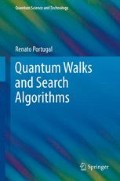Abstract
It is impossible to present quantum mechanics in a few pages. Since the goal of this book is to describe quantum algorithms, we limit ourselves to the principles of quantum mechanics and describe them as “game rules.” Suppose you have played checkers for many years and know several strategies, but you really do not know chess. Suppose now that someone describes the chess rules. Soon you will be playing a new game. Certainly, you will not master many chess strategies, but you will be able to play. This chapter has a similar goal. The postulates of a theory are its game rules. If you break the rules, you will be out of the game.
Access this chapter
Tax calculation will be finalised at checkout
Purchases are for personal use only
Notes
- 1.
The class NP-complete consists of the most difficult problems in the class NP (Non-deterministic Polynomial). The class NP is defined as the class of computational problems that have solutions whose correctness can be “quickly” verified.
References
Diu, B., Cohen-Tannoudji, C., Laloe, F.: Quantum Mechanics. Wiley-Interscience, New York (2006)
d’Espagnat, B.: Conceptual Foundations of Quantum Mechanics. Westview Press, Boulder (1999)
Griffiths, D.: Introduction to Quantum Mechanics, 2nd edn. Benjamin Cummings, Menlo Park (2005)
Kaye, P., Laflamme, R., Mosca, M.: An Introduction to Quantum Computing. Oxford University Press, Oxford (2007)
Mermin, N.D.: Quantum Computer Science: An Introduction. Cambridge University Press, New York (2007)
Nielsen, M.A., Chuang, I.L.: Quantum Computation and Quantum Information. Cambridge University Press, New York (2000)
Omnès, R.: Understanding Quantum Mechanics. Princeton University Press, Princeton (1999)
Peres, A.: Quantum Theory: Concepts and Methods. Springer, Berlin (1995)
Preskill, J.: Lecture Notes on Quantum Computation. http://www.theory.caltech.edu/~preskill/ph229 (1998)
Rieffel, E., Polak, W.: Quantum Computing, a Gentle Introduction. MIT, Cambridge (2011)
Sakurai, J.J.: Modern Quantum Mechanics. Addison Wesley, Reading (1993)
Author information
Authors and Affiliations
Rights and permissions
Copyright information
© 2013 Springer Science+Business Media New York
About this chapter
Cite this chapter
Portugal, R. (2013). The Postulates of Quantum Mechanics. In: Quantum Walks and Search Algorithms. Quantum Science and Technology. Springer, New York, NY. https://doi.org/10.1007/978-1-4614-6336-8_2
Download citation
DOI: https://doi.org/10.1007/978-1-4614-6336-8_2
Published:
Publisher Name: Springer, New York, NY
Print ISBN: 978-1-4614-6335-1
Online ISBN: 978-1-4614-6336-8
eBook Packages: Physics and AstronomyPhysics and Astronomy (R0)

